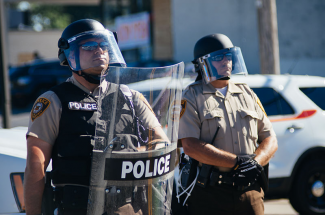
via Wikimedia
A new investigation has revealed a specific way the criminal justice system is failing to secure justice for all. The troubling report by a USA TODAY Network “found that widespread failure by police departments and prosecutors to track problem officers makes it impossible to disclose that information to people whose freedom hinges on the integrity of law enforcement.”
The USA TODAY report refers to a 1963 Supreme Court ruling “that prosecutors must tell anyone accused of a crime about all evidence that might help their defense at trial. That includes sharing details about police officers who have committed crimes, lied on the job or whose honesty has been called into doubt.”
What they found was thousands of people have been incarcerated based on the testimony of officers with problematic records. Furthermore, “at least 300 prosecutors’ offices across the nation are not taking steps necessary to comply with the Supreme Court mandates. These places do not have a list tracking dishonest or otherwise untrustworthy officers.”
What makes the situation even worse is that those who do track officers with problematic records often have incomplete lists - and are not taking the necessary steps to make this information available to the public. That means that the constitutional right to know the evidence against a defendant is being jeopardized by the neglect to inform those on trial about problem police officers.
Prosecutors have way more power than many people may realize. How a situation comes to pass in the criminal justice system often has less to do with a judge or a jury - because it all starts with the district attorney's office.
Criminal justice expert and Professor of Law at American University Washington College of Law Angela J. Davis writes that “the most powerful official in the criminal justice system who makes the most critical decisions that often lead to unjust results is the prosecutor.”
Prosecutorial power to use what’s known as “Brady lists,” “exclusion lists,” or “no-call lists” is being underused across the nation. This type of list allows a district attorney’s office to reject cases from officers with discriminatory or bad records.
Wrongful convictions are an epidemic in the U.S. criminal justice system. USA TODAY notes that “The National Registry of Exonerations shows that cases overturned because of perjury and official misconduct by prosecutors or police have more than doubled from 2008 to 2018.”
Demands from Black Americans around accountability and increased police scrutiny are a direct reflection of the USA TODAY investigation’s results. Electing prosecutors that utilize the tools at their disposal could make a difference.